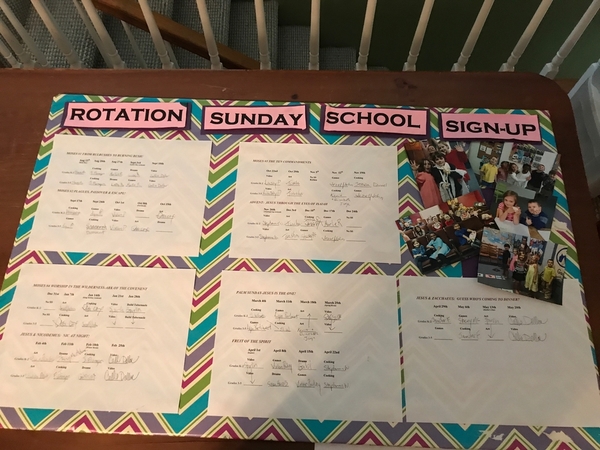
Familiar and Not-so-familiar Recruiting Pools
...where to look for potential Sunday School teachers
Couples
This seems obvious, but sometimes individuals say "no" because they don't want to be apart from their spouse or significant other at church. And many couples are looking for things they can do together. Recruiting couples is also a great way to encourage their mutual spiritual development.
Family Teams
This can include a grandparent and a teen. It can include a parent & child teaching together. Keep in mind that "families" can also mean young adults in your church looking to spend time with one another in meaningful ways. One advantage of asking "units" is that they will tend to say "yes" if one person wants to do it.
"Come Teach with Me"
This is how I started teaching when I was 17 yrs old. Someone asked me to help them and I was flattered by their appeal, not to any innate sense of my ability. Discovering diamonds in the rough are one of the joys of recruiting.
People Who Want to Start Reading and Studying the Bible More
One of the great secrets of Sunday School teachers is that they use lesson preparation and teaching as part of their Bible study routine. For those who feel like they "don't know enough" --having to prepare and teach is a great Bible study routine to get into. The Corollary to this is people who care about kids and say they want to make a difference in the world. Well here's your chance.
Former Youth Leaders
I have run into some older members who "used to help with youth group way back when" and don't feel they have the energy to work with youth anymore, or aren't sure they can connect with today's kids. But... these "old youth leaders" often still have a desire and rapport with kids that's alive and hungry to connect.
"Helpers"
Some of my best recruits started out "just helping." Once they get over their fears or inexperience, they often turn into great teachers. This is also a reason to always be asking people for minimum one-time commitments. You'll discover more teachers that way.
New Members
New members often come with a bunch of experience and are looking to connect. Teaching is a great way for them to connect with the PARENTS of their students and other teachers, and immediately feel connected during their first critical year being a new member.
Young Adult Couples (Married and Unmaried)
It's a bit of a cliche, but Sunday School kids can fill (or try-out) that "family feeling" some young unmarried couples are trying on for size.
Childless Older Couples or Empty-Nesters
The nurturing instinct doesn't go away just because you can't have children or your children have grown. Many older adults are concerned they won't connect with today's kids or don't have the energy, but are pleasantly surprised.
Intergenerational Events
If there is only one reason to do at least one intergenerational event a year, it's to "spy" for potential recruits, and give them an opportunity to help lead.
YOU
If you're the Pastor or Church Educator reading this, put your name on the teaching list. Lead by example, and don't let your teacher chops and experience get stale or go untapped.
Don't make it harder than it already is...
Some churches make it HARD to recruit volunteers because of past practices and poor leadership. Volunteers have long memories.
While this advice was originally posted for Rotation Model churches, it applies to all types of Sunday Schools.
Examples of How Churches Shoot Themselves in the Recruiting Foot:
 Asking experienced teachers for short commitments. Even though Rotation gives teachers four to five-week story commitments --it doesn't mean they can't keep teaching in subsequent rotations, or sign up for several across the year (without you having to go recruit them for every single time). (Conversely, you want to "try out" folks who don't have much experience or you don't know well enough.)
Asking experienced teachers for short commitments. Even though Rotation gives teachers four to five-week story commitments --it doesn't mean they can't keep teaching in subsequent rotations, or sign up for several across the year (without you having to go recruit them for every single time). (Conversely, you want to "try out" folks who don't have much experience or you don't know well enough.)
 Needing two lead teachers instead of one because somebody thinks your 2nd graders shouldn't be in the same class with your 3rd graders. Two small classes require more teachers and resources than one combined class.
Needing two lead teachers instead of one because somebody thinks your 2nd graders shouldn't be in the same class with your 3rd graders. Two small classes require more teachers and resources than one combined class.

 Too many people opting to become "shepherds" (or "helpers) instead of "teachers." While recruiting people to "help" is a great way to get them involved and train them, at some point you need to ask them to step up. (In the Rotation Model, some Rotation churches have eliminated the position of "shepherds" for just this reason. People were using it as an excuse to not fully engage.)
Too many people opting to become "shepherds" (or "helpers) instead of "teachers." While recruiting people to "help" is a great way to get them involved and train them, at some point you need to ask them to step up. (In the Rotation Model, some Rotation churches have eliminated the position of "shepherds" for just this reason. People were using it as an excuse to not fully engage.)
 Lame workshops or curriculum or rooms that don't attract people to teach. Classrooms should be designed to attract both kids and teachers.
Lame workshops or curriculum or rooms that don't attract people to teach. Classrooms should be designed to attract both kids and teachers.
 Not being asked! YES....not being asked. I've been a volunteer in churches where I'm sort of amazed that the CE person simply didn't ASK ME to help. I guess they figured I was too busy, or as a minister residing in their pews, too ministerial! How many people in your church have never been personally ASKED to teach?
Not being asked! YES....not being asked. I've been a volunteer in churches where I'm sort of amazed that the CE person simply didn't ASK ME to help. I guess they figured I was too busy, or as a minister residing in their pews, too ministerial! How many people in your church have never been personally ASKED to teach?
 Lack of material support. Leaders who don't get materials and supplies to their volunteers on-time, or don't follow up with them to see if they need help
Lack of material support. Leaders who don't get materials and supplies to their volunteers on-time, or don't follow up with them to see if they need help
 Lack of training and help. Many people say "no" after being left to fend for themselves.
Lack of training and help. Many people say "no" after being left to fend for themselves.
 Keep asking the same person to do the recruiting --the same person who didn't do a great job of it last time. Different people have different circles and approaches. And some people are lousy at recruiting.
Keep asking the same person to do the recruiting --the same person who didn't do a great job of it last time. Different people have different circles and approaches. And some people are lousy at recruiting.
 Asking half of a married couple to teach rather than asking both. Many couples are looking for things to do together and not spend more time apart. Recruit couples where possible.
Asking half of a married couple to teach rather than asking both. Many couples are looking for things to do together and not spend more time apart. Recruit couples where possible.
 Only asking parents. With training and help, many young adults can be good teachers. As well, today's "grandparent generation" is more agile than they were 40 years ago, and many retired folks have a deep bag of teaching experience and love for children to share.
Only asking parents. With training and help, many young adults can be good teachers. As well, today's "grandparent generation" is more agile than they were 40 years ago, and many retired folks have a deep bag of teaching experience and love for children to share.
 Pastors who don't support teachers and highlight their work to others. It's natural for many people not to want to volunteer for things that are under-appreciated or apparently not a high priority. (Pastors: attend classes and Sunday School events!)
Pastors who don't support teachers and highlight their work to others. It's natural for many people not to want to volunteer for things that are under-appreciated or apparently not a high priority. (Pastors: attend classes and Sunday School events!)
 Not communicating regularly, checking in, encouraging, and helping your current teachers (especially your new teachers). Recruiting is easier if you have fewer slots that need filled. Don't burn your current commitments.
Not communicating regularly, checking in, encouraging, and helping your current teachers (especially your new teachers). Recruiting is easier if you have fewer slots that need filled. Don't burn your current commitments.
















 A "top ten" list from Rotation.org member Heather Eaton who wrote to say they turned it into a PowerPoint that they presented during worship announcements to recruit Sunday School teachers.
A "top ten" list from Rotation.org member Heather Eaton who wrote to say they turned it into a PowerPoint that they presented during worship announcements to recruit Sunday School teachers.










 See the
See the 
























